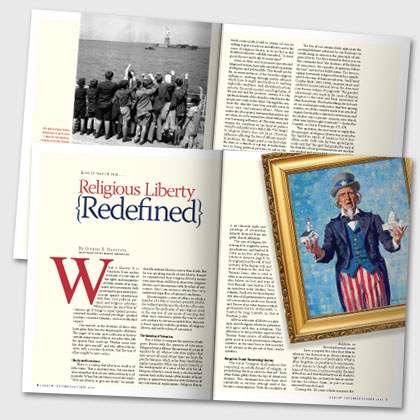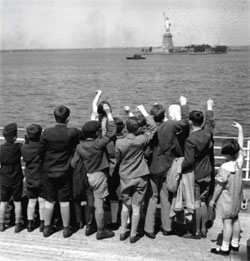Religious Liberty {Redefined}
Gideon D. Hagstotz September/October 2009
What is liberty? It is freedom from undue restraint; it is the sum of the rights and immunities of all the citizens of an organized civil community, with provision for guaranteed protection against interference with their civil, political, personal, and religious activities. What pictures the word “liberty” conjures up! It brings to mind opened prisons, removed shackles, restored privileges, granted pardons, reunited families, and reestablished respect.
One marvels at the devotion of those who have given their lives for the principles of liberty. The pages of secular and ecclesiastical history contain many names of those crusaders who, like the apostle Paul, could say, “Neither count I my life dear unto myself,” and who offered themselves with a ceaseless devotion, that the way of others might be more secure.
Liberty and Conscience
There is a saying that liberty in itself is of little value. That is doubtless true, but one must also remember that all else without liberty is of no profit. When Patrick Henry voiced the words “Give me liberty, or give me death,” he meant that life without liberty is worse than death. But he was speaking merely of civil liberty. It must be remembered that religious liberty means even more than civil liberty. Moreover, religious liberty is not synonymous with freedom of conscience. One’s conscience is always free—it is unfettered regardless of external conditions.
Liberty implies a state of affairs in which a member of a state or society is permitted to follow without interference the dictates of his conscience in the profession of any religious creed or the exercise of any mode of worship. But when one’s conscience points the way to overt acts contrary to certain accepted ideas, then one is faced squarely with the problem of religious liberty, and not freedom of conscience.
The Question of Toleration
Nor is it fair to compare the question of religious liberty with the question of toleration. Religious liberty affirms the existence of a state of equality for all, whereas toleration implies that men are not all equal. Many times one hears the plea for tolerance, which, as has been stated before, implies inequality. What one should strive for is the development of a sense of fair play for all. Religious liberty is more than a circumscribed opinion born in the minds of the leaders of lesser groups as against intrenched or vested interests of any ecclesiastical organizations. Religious liberty is an inherent right and privilege of citizenship entirely divorced from any given church affiliation.
The core of religious liberty must be sought for in two specifications, said Sanford H. Cobb, in his Rise of Religious Liberty in America, page 9, “in its origination in the will of God as Maker of the human soul, and in its relation to the civil law.” Thomas Paine, who is cited so often as an avowed enemy of those who believe in God, and even of God Himself, said, back in 1776 in an open letter to the Quakers, “As to religion, I hold it to be the indispensable duty of all governments to protect all conscientious professors thereof, and I know of no other business which governments hath to do therewith.”—Quoted by Luigi Luzzatti, in God in Freedom, p. 686.
All true advocates of liberty as a principle, and of religious liberty in particular, will agree with this assumption. The adherence to the postulate expressed by Thomas Paine assures all adherents to a given creed or creeds protection in religious activities on the same basis as that accorded to all citizens in the pursuit of their secular activities.
Dangerous Trends Threatening Liberties
The words “Congress shall make no law respecting an establishment of religion, or prohibiting the free exercise thereof” have often fallen glibly from the lips of American citizens. This statement has also been cited repeatedly in various settings until it has become commonplace. With the credulity of
children, or the uninformed, many have accepted the idea that liberty, taken in the abstract or in direct relation to rights of citizenship, is a fixed reality. What is often forgotten, or possibly not even known, is that America, though still doubtless the home of the brave, is not necessarily the land of the free; and that the liberty we all claim to prize so highly has, in many instances and in various localities, been, in part at least, removed from the land.
During the 150 years which measure the existence of constitutional America, repeated efforts have been made to favor certain groups as against others until it is a matter well understood by many that there has developed a state of pronounced retrogression in the matter of religious independence. This degeneracy of religious liberty has reached such proportions that there is hardly a state left in the Federal Union which has not been attacked with religious bills purporting to promote the welfare of the commonwealth.
There is always a danger of considering the problem of religious liberty too much from the angle of one church, and that the church to which we happen to belong. Let us not forget that the subject of religious liberty must be placed squarely on the proposition that the curtailment or regulation of anyone’s innermost beliefs—be he Catholic or Protestant, Jew or Gentile, atheist or Seventh-day Adventist—with their resultant acts, is a direct attack upon part of the American system of government. And as we grant that the principle of religious liberty assumes that all people have certain rights and privileges, we should likewise be willing to uphold these privileges and rights as citizens as well as Christians.
In substantiation of this assertion the words of Thomas Francis Bayard, secretary of state during President Cleveland’s first administration, as found in Volume IV of the International Law Digest, are herewith quoted: “Religious liberty is the chief cornerstone of the American system of government, and provisions for its security are embedded in the written charter and interwoven in the moral fabrics of its laws. Anything that tends to invade a right so essential and sacred must be carefully guarded against, and I am satisfied that my countrymen, ever mindful of the sufferings and sacrifices necessary to obtain it, will never consent to its impairment for any reason or under any pretext whatsoever.”—Quoted by Luzzatti, in God in Freedom, p. 674.

Fifty Jewish refugee children, between ages 5 and 16, arrive in New York from Hamburg, Germany, on the liner President Harding on June 3, 1939. (AP Photo)
Mr. Bayard’s statement constitutes a challenge which all church members ought to be willing to face and meet courageously. Do we think that because we have walked a comparatively serene path, it will be always so? Are we willing to give a ready ear and effective aid to the cause of religious liberty, or do we feel as did Hezekiah when he selfishly remarked, “Is it not good, if peace and truth be in my days?”
Some, in their zeal to promote unrestricted religious freedom, have advocated full separation of religious and political life. This should not be; for, in many instances, it has been the religious influences working through public officials which have brought amelioration to existing deplorable conditions. Such alleviation has been noted in the much-needed social legislation of the present and the previous century. It is the spiritual element of the churches which led to the progressive work in this field. Through the centuries the churches have been morally active in local, state, and national affairs. When one makes the oft-repeated statement that politics are not clean, it is to be remembered that without the ever-leavening influence of Christian men and women the condition in the field of politics would be infinitely more deplorable. The danger to religious liberty does not lie in Christian influences affecting the lives of officials in public positions; the danger point is reached when the state, or a church, or a group of individuals, tries to bring political pressure to aid in the propagation of religious creeds.
Danger Ahead?
Probably Americans generally believe there is no real danger of religious bigotry and persecution’s ever finding root in our soil. Doubtless many would subscribe to the idea once expressed by Lord Bryce in a moment of wishful thinking, who, in speaking of America, said, “In no imaginable future is there likely to be any attempt to repress either by law or opinion the free exercise of speculative thought on morals, on religion, and, indeed, in every matter not within the immediate range of politics.”—Quoted by Dieffenbach, in Religious Liberty, p. 138.
It is seldom that one finds Lord Bryce so far afield from actuality. When he remains within the province of historical writing there is no one more worthy than he to be called an authority; but when he leaves the historical field to explore future conditions or possibilities, he misses his calling. During the approximately five decades since Lord Bryce voiced this conjecture, the situation has greatly changed: rights of religionists in many states have been ignored, local legislation or ordinances have come into existence, and efforts have repeatedly been made to formulate and enact legislation of a religious nature on a national and even an international scale.
Too few of our citizens fully appreciate the accomplishment achieved by our forebears in establishing in America the principle of religious liberty. Too few remember that it was on this continent that “the doctrine of the liberty of conscience, the equality of opinions before the law,” met its first full fruition. Too few recognize how much religious liberty has contributed to the sum of human endeavor. Said David Dudley Field (1805-1894), eminent jurist and authority in international law in the American Law Review, volume 27, page 645: “The greatest achievement ever made in the cause of human progress is the total and final separation of church and state. If we had nothing else to boast of, we could claim with justice that first among nations, we of this country made it an article of organic law that the relations between man and his Maker were a private concern, into which other men had no right to intrude.”—Quoted by Luzzatti, in God in Freedom, pp. 673, 674.
This quotation does not mean to imply that the principle of religious liberty was created by the legislative minds of America, but it does affirm, as Mr. Cobb, who has been quoted previously, said, that “the spirit that guided the work of the founders of our government was not one that was crushed and screwed into sectarian molds by the decrees of intolerant councils, and by the subtleties of ingenious priests; it recognizes the value of every creed, but rises above them all. The grand and noble purpose was to establish justice, promote the general welfare, and secure the blessings of liberty to ourselves and our posterity. This is the lesson of the development of civil as well as religious liberty in the United States.”—Rise of Religious Liberty in America, p. 270.
Many of those who were pioneers for the cause of religious liberty in America doubtless worked without fully recognizing the significance of their task. But whether they understood and appreciated the full significance of all they were doing, we who can look back upon the blessings of a century and a half of liberty must acknowledge that more than human wisdom must have been vouchsafed to those who sat in the Constitutional Convention as they formulated the charter which was to guide the destinies of the infant nation.
With liberties, especially religious liberty, being taken from men the world around, Americans should reverently pledge anew wholehearted loyalty to the principles that have made this nation great.